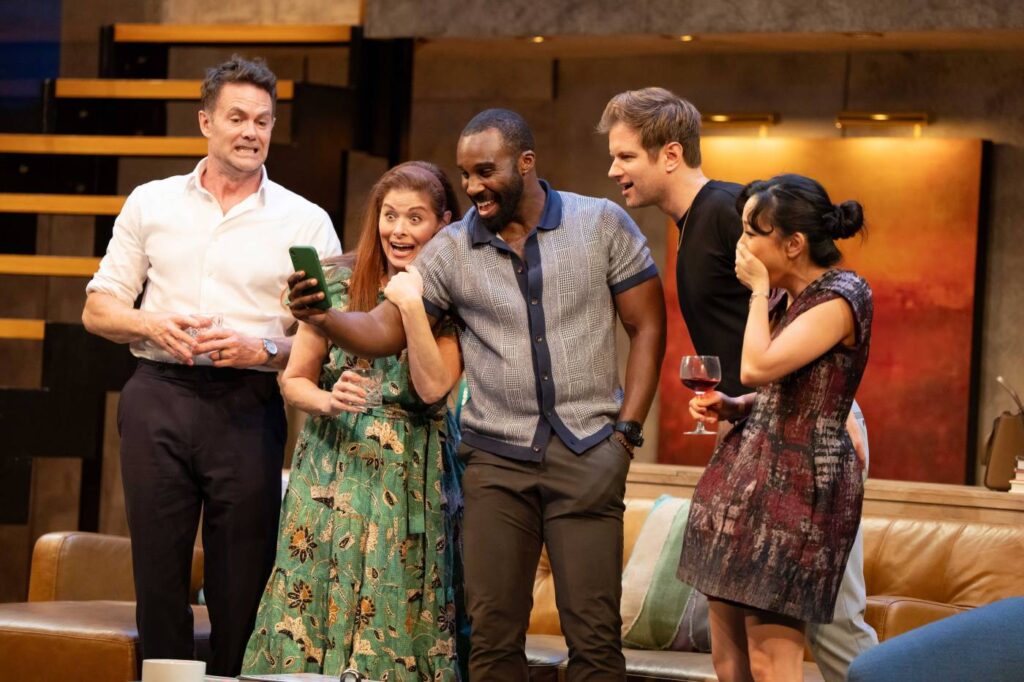A toxic comedy of ill manners.
BY CHRISTOPHER BYRNE
Robert O’Hara’s disappointing new comedy Shit. Meet. Fan. is a clumsy affair that relies on a tired gimmick to make its point. Spoilers follow, and while I seldom reveal surprises, it’s impossible to discuss this particular play without doing so.
That gimmick, which was done with far greater success in Jeremey O. Harris’ Slave Play is that what is happening on stage may or may not be real. (O’Hara directed that play on Broadway, which is probably where he got the idea.) While Harris used the trope to illuminate a conversation about race in our culture, O’Hara’s version comes off cheap, as if he’s hedging his bets, afraid to take a stand and undermining the social commentary the play purports to express.
The central tenet of the piece is that each of us has secret lives and that peace in our relationships is maintained by zealously guarded cellphones. The premise is that if the contents of one’s emails, text messages, and calls were known to our intimate partners, they would reveal a very different person than we present. It’s a dark premise, and it assumes that people are selfish, unethical, and leading a false life. It’s a decidedly cynical worldview, and O’Hara’s world is populated by unpleasant, selfish and remarkably vulgar people.
In the play, the premise is that a group of friends has gathered at the apartment of Rodger and Eve to watch the lunar eclipse. Eve suggests a game where everyone’s cellphones will be available to all for the next couple of hours, and people have to share every text, email or call. The supposition is that no one has anything to hide, but, of course, that’s not the case. Over the course of a long and predictable evening, everyone is revealed to have something to hide, is cheating on their partner, is secretly gay, or is otherwise completely miserable. The veneer of sociability is intended to mask it all, but every one of these people is, at best, unpleasant, so even spending just under two hours with them is a trial.

O’Hara’s writing rarely exceeds a workmanlike plodding. The long expository scene between Rodger and Eve at the outset is riddled with information that they would have known and sounds more like a PowerPoint delivery of character information than a married couple actually talking to each other.
The “game” as they call it reminds one of The Boys in the Band, in that it’s inherently intrusive and cruel, but in mechanical fashion, each character gets a turn to show how awful they are beneath their shallow surfaces. More significantly, what’s revealed is that these people, for all their long-term friendships, really don’t know one another at all. It’s hard to imagine their being as close as they say, or why they would still know one another. Perhaps the point, but it’s a bleak one. What’s more, the situations are trite, the dialogue pure sitcom (and often surprisingly tasteless), and the jokes, such as they are, are telegraphed from miles away.
The only character who reveals anything approaching a soul is Logan, “the black friend,” who is revealed as gay because another character convinces him to change phones so his alcoholic wife won’t see that he’s getting gifs of an animated, talking vagina. (I kid you not.) While Logan has some heartfelt things to say about his closeted life and being a black man in a white culture, it doesn’t stop the hateful “fag” jokes, which even if they’re not true—per the trope—are still said…and still felt. Perhaps this is the playwright’s rage bubbling to the surface, but it doesn’t work with a contemporary audience. Perhaps that’s the point—to wring any possibility for sympathy with the other characters out of the play. Still, it borders on verbally abusing the audience.
Because this is a failure or a sitcom, it only makes sense that high profile sitcom actors would be in the cast. Though it’s always a pleasure to see them, Neil Patrick Harris, Jane Krakowski, Debra Messing, Constance Wu, and the rest are far better actors than the material gives them the chance to be. Krakowski especially has been saddled with speeches, as mentioned above, that no real person would utter. Trammel Tillman as Logan is quite affecting.
So, at the end, as mentioned, we’re left with the question as to whether all of this actually happened. The couples who have stormed out of the apartment are seen on the street hugging and talking. Eve says that she’s glad Rodger didn’t let them play the game. Okay. Cute. But of none of what we just sat through didn’t happen, in whose imagination—or deep-seated neurosis—is the play set? It all seems like an excuse to have that juvenile argument: kidding/not kidding.
I would, however, like to live in the apartment designer Clint Ramos has created, and when things get especially awful, one can console oneself wondering about the value of such a palatial Brooklyn home.
Unfortunately, though, I was left thinking of the musical Applause. In a drunken evening Margo Channing says, “Here’s a good party game. Why don’t you all choose up sides and go home?” After enduring this play, that’s the only game I was up for.
Shit.Meet. Fan.
MCC Theater Space
511 West 52nd Street
Tues-Fri 7 p.m.; Sat 8 p.m.; Sun 3 p.m. through December 15
$99-$299 at MCC Theater
Posted December 2, 2024
Photos by Julia Cervantes









More Stories
Off Broadway Feature: Audrey Heffernan Meyer in “Art of Leaving”
An Artistic Life in the Theater: David Greenspan’s sui generis career
Broadway Review: Art